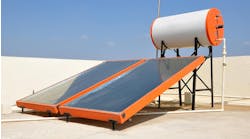Latest from Solar
Sponsored
WASHINGTON, DC — Secretary of Energy Jennifer M. Granholm yesterday joined college students from around the world to announce the winners of the U.S. Department of Energy (DOE) Solar Decathlon—a collegiate competition that challenges the next generation of building professionals to design and construct high-performance, low-carbon buildings powered by renewable energy. The 72 competing teams representing 12 countries designed resilient and energy-efficient, homes, schools, offices, and retail spaces; nine of which were constructed and presented in the first-ever Solar Decathlon Virtual Village on the National Mall in Washington, D.C.
Watch Sunday’s awards ceremony and Secretary Granholm’s remarks HERE.
“Our fight against the climate crisis is a lot like a decathlon, with all kinds of individual contests we need to get through—and we can’t win unless we do well in them all,” said Secretary Granholm. “Today’s decathletes are tomorrow’s architects and engineers who are going to help us achieve President Biden’s ambitious and achievable clean energy goals and build our net-zero future. I can’t wait to see their big ideas come to life in neighborhoods across the country and around the world.”
According to DOE analysis, today buildings account for approximately 74% of electricity use, 39% of total energy use, and 35% of carbon emissions in the United States. There are more than 125 million buildings in the nation that need to be retrofitted in order to achieve the Administration’s goal of net-zero emissions by 2050—which President Biden’s American Jobs Plan proposes to address. The Solar Decathlon supports a key strategy to bring that vision to life, by building a pipeline of energy-savvy workers who are prepared for millions of future jobs in design, construction, retrofitting, weatherization, and more.
The full list of the winners of the 2020 Build Challenge and 2021 Design Challenge is below:
2020 Build Challenge Overall Winners
- 1st Place, University of Colorado (Boulder, Colorado)
- 2nd Place, University of Waterloo (Waterloo, Ontario)
- 3rd Place, University of Nevada, Las Vegas (Las Vegas, Nevada)
2021 Design Challenge Grand Winners
- Commercial Divisions, University of Oregon (Eugene, Oregon)
- Residential Divisions, Northwestern University (Evanston, Illinois)
2020 Build Challenge Contest Winners
Energy Performance
- 1st Place, Weber State University (Ogden, Utah)
- 2nd Place (tie)
- University of Colorado (Boulder, Colorado)
- University of Nevada, Las Vegas (Las Vegas, Nevada)
- 3rd Place, University of Illinois at Urbana-Champaign, Urbana (Champaign County, Illinois)
Engineering
- 1st Place, Hogeschool Utrecht University of Applied Sciences Utrecht (Utrecht, Netherlands)
- 2nd Place, University of Colorado (Boulder, Colorado)
- 3rd Place, Weber State University (Ogden, Utah)
Financial Feasibility & Affordability
- 1st Place, University of Waterloo (Waterloo, Ontario)
- 2nd Place, University of Colorado (Boulder, Colorado)
- 3rd Place, Kansas State University (Manhattan, Kansas)
Resilience
- 1st Place, Universidad Técnica Federico Santa María (Valparaíso, Chile)
- 2nd Place, University of Waterloo (Waterloo, Ontario)
- 3rd Place, University of Colorado (Boulder, Colorado)
Architecture
- 1st Place, University of Colorado (Boulder, Colorado)
- 2nd Place, Hogeschool Utrecht University of Applied Sciences Utrecht (Utrecht, Netherlands)
- 3rd Place, Kansas State University (Manhattan, Kansas)
Operations
- 1st Place, University of Nevada, Las Vegas (Las Vegas, Nevada)
- 2nd Place, University of Colorado (Boulder, Colorado)
- 3rd Place, Hogeschool Utrecht University of Applied Sciences Utrecht (Utrecht, Netherlands)
Market Potential
- 1st Place, University of Colorado (Boulder, Colorado)
- 2nd Place, Kansas State University (Manhattan, Kansas)
- 3rd Place, University of Waterloo (Waterloo, Ontario)
Comfort & Environmental Quality
- 1st Place, University of Illinois at Urbana-Champaign, Urbana (Champaign County, Illinois)
- 2nd Place, University of Waterloo (Waterloo, Ontario)
- 3rd Place, University of Colorado (Boulder, Colorado)
Innovation
- 1st Place, University of Colorado (Boulder, Colorado)
- 2nd Place, University of Nevada, Las Vegas (Las Vegas, Nevada)
- 3rd Place (tie)
- University of Waterloo (Waterloo, Ontario)
- Universidad Técnica Federico Santa María (Valparaíso, Chile)
Presentation
- 1st Place, University of Nevada, Las Vegas (Las Vegas, Nevada)
- 2nd Place, Weber State University (Ogden, Utah)
- 3rd Place, University of Colorado (Boulder, Colorado)
2021 Design Challenge Division Winners
Suburban Single-Family Housing Division
- 1st place, Ferris State University (Big Rapids, Michigan)
- 2nd place, Missouri University of Science and Technology (Rolla, Missouri)
- 3rd place, Appalachian State University (Boone, North Carolina)
Urban Single-Family Housing Division
- 1st place, Northwestern University (Evanston, Illinois)
- 2nd place, The University of Arizona (Tucson, Arizona)
- 3rd place, Ball State University (Muncie, Indiana)
Attached Housing Division
- 1st place, Marywood University (Scranton, Pennsylvania)
- 2nd place, Indian Institute of Technology Bombay (Mumbai, India)
- 3rd place, Monash University (Melbourne, Australia)
Mixed-Use Multifamily Building Division
- 1st place, The University of British Columbia (Vancouver, Canada)
- 2nd place, The University of Arizona (Tucson, Arizona)
- 3rd place, University of Missouri-Columbia (Columbia, Missouri)
Elementary School Division
- 1st place, University of Oregon (Eugene, Oregon)
- 2nd place, Ryerson University (Toronto, Canada)
- 3rd place, Ball State University (Muncie, Indiana)
Office Building Division
- 1st place, Virginia Polytechnic Institute and State University (Blacksburg, Virginia)
- 2nd place, Ryerson University (Toronto, Canada)
- 3rd place, Harvard University (Cambridge, Massachusetts)
Retail Building Division
- 1st place, Illinois Institute of Technology (Chicago, Illinois)
- 2nd place, Thomas Jefferson University (Philadelphia, Pennsylvania)
- 3rd place, Sathyabama Institute of Science and Technology (India)
About the Solar Decathlon
The Solar Decathlon is a collegiate competition that challenges the next generation of building professionals to design and construct high-performance, low-carbon buildings powered by renewable energy, while promoting student innovation, STEM education, and workforce development opportunities in the buildings industry. Since 2002, more than 20,000 students have participated in the Solar Decathlon, many of whom have gone on to become architects, engineers, and researchers. This year’s competition marks the 19th anniversary of the Solar Decathlon.
The Design Challenge is a one- to two-semester, design-only competition, while the Build Challenge is a two-year design-build competition.
Applications for the Solar Decathlon 2022 Design Challenge and 2023 Build Challenge will open this summer. Additional details are available on the Solar Decathlon website.


